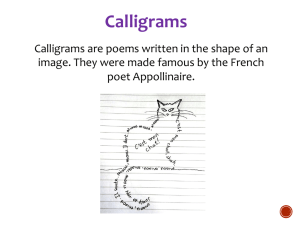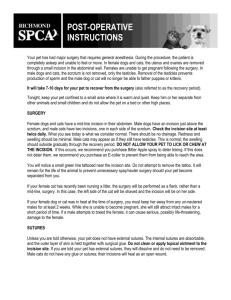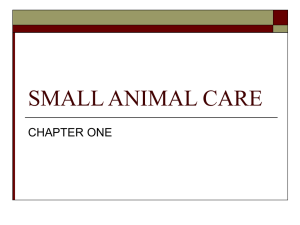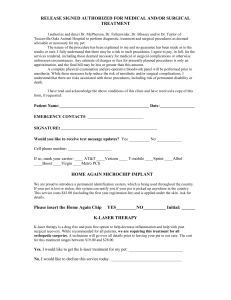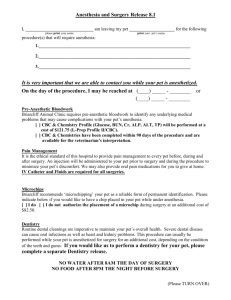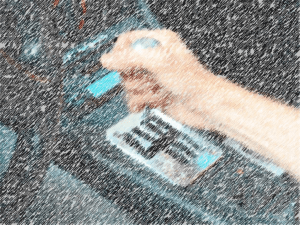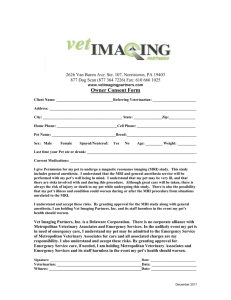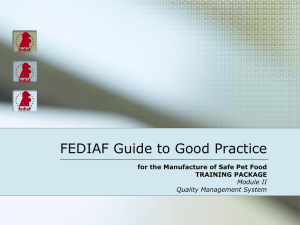THE ASPCA CARES MOBILE ANIMAL CLINIC – COMMONLY
advertisement
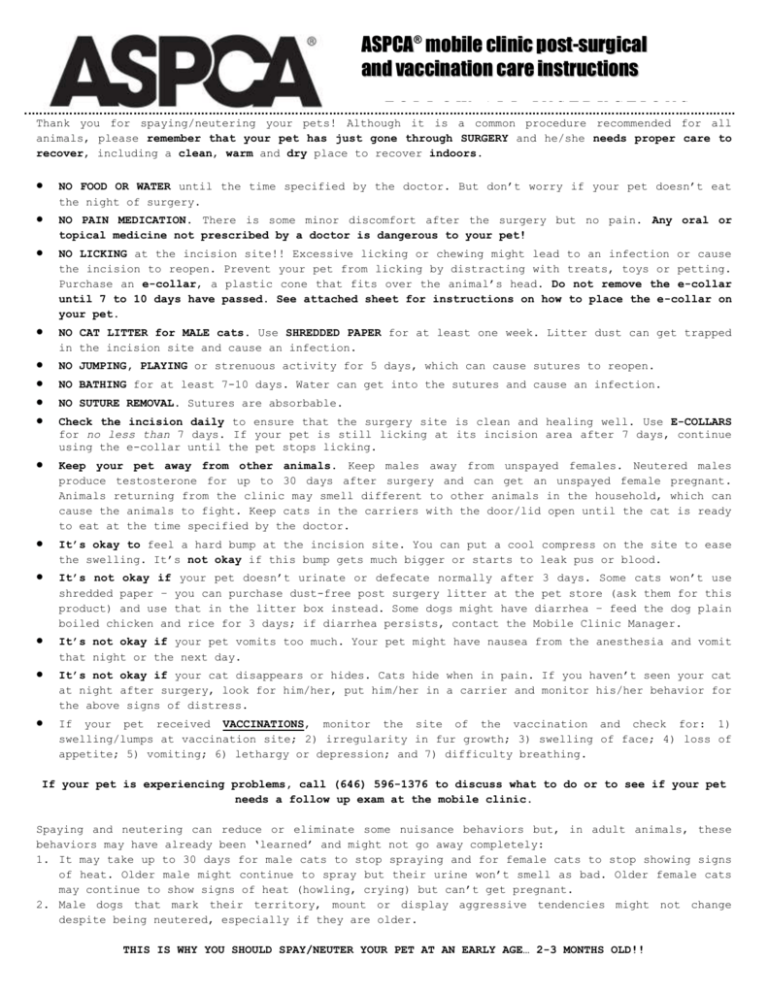
ASPCA® mobile clinic post-surgical and vaccination care instructions FOLLOW ALL INSTRUCTIONS Thank you for spaying/neutering your pets! Although it is a common procedure BEL O W ! recommended for all animals, please remember that your pet has just gone through SURGERY and he/she needs proper care to recover, including a clean, warm and dry place to recover indoors. NO FOOD OR WATER until the time specified by the doctor. But don’t worry if your pet doesn’t eat the night of surgery. NO PAIN MEDICATION. There is some minor discomfort after the surgery but no pain. Any oral or topical medicine not prescribed by a doctor is dangerous to your pet! NO LICKING at the incision site!! Excessive licking or chewing might lead to an infection or cause the incision to reopen. Prevent your pet from licking by distracting with treats, toys or petting. Purchase an e-collar, a plastic cone that fits over the animal’s head. Do not remove the e-collar until 7 to 10 days have passed. See attached sheet for instructions on how to place the e-collar on your pet. NO CAT LITTER for MALE cats. Use SHREDDED PAPER for at least one week. Litter dust can get trapped in the incision site and cause an infection. NO JUMPING, PLAYING or strenuous activity for 5 days, which can cause sutures to reopen. NO BATHING for at least 7-10 days. Water can get into the sutures and cause an infection. NO SUTURE REMOVAL. Sutures are absorbable. Check the incision daily to ensure that the surgery site is clean and healing well. Use E-COLLARS for no less than 7 days. If your pet is still licking at its incision area after 7 days, continue using the e-collar until the pet stops licking. Keep your pet away from other animals. Keep males away from unspayed females. Neutered males produce testosterone for up to 30 days after surgery and can get an unspayed female pregnant. Animals returning from the clinic may smell different to other animals in the household, which can cause the animals to fight. Keep cats in the carriers with the door/lid open until the cat is ready to eat at the time specified by the doctor. It’s okay to feel a hard bump at the incision site. You can put a cool compress on the site to ease the swelling. It’s not okay if this bump gets much bigger or starts to leak pus or blood. It’s not okay if your pet doesn’t urinate or defecate normally after 3 days. Some cats won’t use shredded paper – you can purchase dust-free post surgery litter at the pet store (ask them for this product) and use that in the litter box instead. Some dogs might have diarrhea – feed the dog plain boiled chicken and rice for 3 days; if diarrhea persists, contact the Mobile Clinic Manager. It’s not okay if your pet vomits too much. Your pet might have nausea from the anesthesia and vomit that night or the next day. It’s not okay if your cat disappears or hides. Cats hide when in pain. If you haven’t seen your cat at night after surgery, look for him/her, put him/her in a carrier and monitor his/her behavior for the above signs of distress. If your pet received VACCINATIONS, monitor the site of the vaccination and check for: 1) swelling/lumps at vaccination site; 2) irregularity in fur growth; 3) swelling of face; 4) loss of appetite; 5) vomiting; 6) lethargy or depression; and 7) difficulty breathing. If your pet is experiencing problems, call (646) 596-1376 to discuss what to do or to see if your pet needs a follow up exam at the mobile clinic. Spaying and neutering can reduce or eliminate some nuisance behaviors but, in adult animals, these behaviors may have already been ‘learned’ and might not go away completely: 1. It may take up to 30 days for male cats to stop spraying and for female cats to stop showing signs of heat. Older male might continue to spray but their urine won’t smell as bad. Older female cats may continue to show signs of heat (howling, crying) but can’t get pregnant. 2. Male dogs that mark their territory, mount or display aggressive tendencies might not change despite being neutered, especially if they are older. THIS IS WHY YOU SHOULD SPAY/NEUTER YOUR PET AT AN EARLY AGE… 2-3 MONTHS OLD!!


